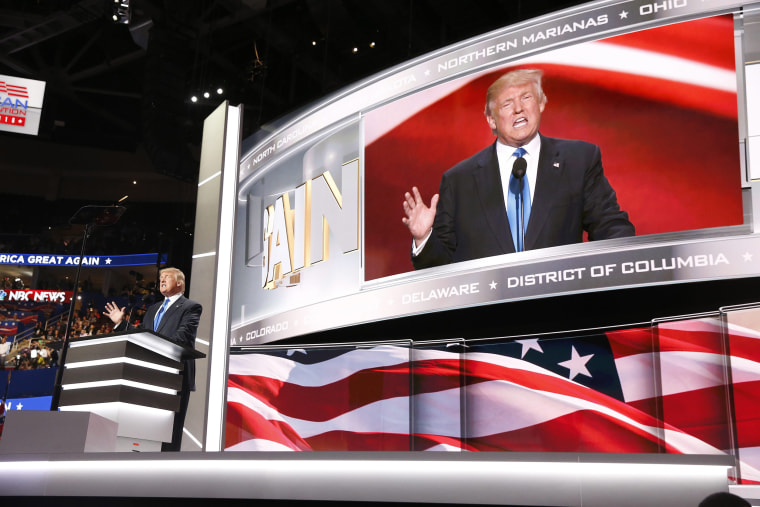CLEVELAND, Ohio — Republican rising stars kept their distance from Donald Trump on the first night of the Republican National Convention, focusing more on Democrat Hillary Clinton than the presumptive nominee’s policies.
On a night devoted to the theme “Make America Safe Again," little mention was made to the major tenets of Trump’s foreign policy: The Muslim ban; the border wall; the renegotiation of NATO and abandonment of nation-building; his openness to countries like Japan and Saudi Arabia getting nuclear weapons if they won’t pay for U.S. defense; waterboarding terrorists.
In fact, little mention was made of Trump at all by some of the biggest speakers of the night. Sens. Tom Cotton and Joni Ernst, Reps. Mike McCaul and Ryan Zinke each make it through nearly two-thirds of their respective speeches before uttering his name. Cotton gave only passing reference to Trump, promising “help is on the way” but not from Trump alone: From “a Trump-Pence administration…with a Republican Congress.”
What reference they did make directly to Trump was vague and avoided endorsing any of his policy proposals. Instead, Republicans used their speeches to focus on the one issue on which they universally agree with Trump: President Obama has been a failure, and Hillary Clinton will be even worse.
“For too long Americans have felt abandoned, and their warnings unheard. Donald Trump has heard these voices loud and clear,” Ernst declared, before pivoting back to an attack on President Obama: “We cannot afford four more years of the same failed policies.”
Ernst also called for a president “who will stand up to our enemies and stand up for our veterans” and “ensure America remains a strong, stabilizing force around the globe.”
It was a line that brought to mind Democrat Hillary Clinton’s attacks on Trump as “dangerous” and a “loose cannon." But Ernst offered no direct examples of how Trump would be that leader, or which of the policies he’s outlined would be a means to that end.
Zinke’s only reference to Trump’s policies was a declaration that the presumptive nominee “isn’t afraid to talk about radical Islamic terrorism, and he won’t be afraid to destroy it.” McCaul, meanwhile, devoted a slightly bigger chunk of his speech to Trump, but touted him only in vague platitudes, promising Trump will “never apologize for American greatness — he will promote it…never allow terrorists to gain ground against America — he will shake the ground they walk on.”
Alabama Sen. Jeff Sessions was a rare elected official to promote Trump’s policies in his speech, but the immigration hardliner focused most closely on what he knows: Immigration, largely avoiding other national security issues with his address.
Trump's willingness to buck party orthodoxy was a key part of his appeal throughout the GOP primary, and he rose to the nomination in part by appealing to new or disillusioned Republican voters with his often controversial policy proposals.
But it’s caused Republicans significant heartburn as they grapple with the challenge of accepting, if not outright advocating for, policies that at times are anathema to long-held GOP priorities and values.
The distance Monday night’s speakers kept from the presumptive nominee they were supposed to be celebrating put that heartburn on awkward display, and underscored the deep divisions remaining within the party even as they gather in Cleveland to celebrate party unity this week. And it's unlikely to be the last night of the GOP convention where the speakers’ messages don’t line up directly with Trump’s.
On Tuesday, where the theme is “Make America Work Again,” many of the speakers have diverged with Trump on economic and trade policy, including House Speaker Paul Ryan and Senate Majority Leader Mitch McConnell. Wednesday night features Sen. Marco Rubio and Ohio Gov. Scott Walker, two former opponents turned reluctant endorsers of Trump, and Sen. Ted Cruz, who has yet to offer his support.
